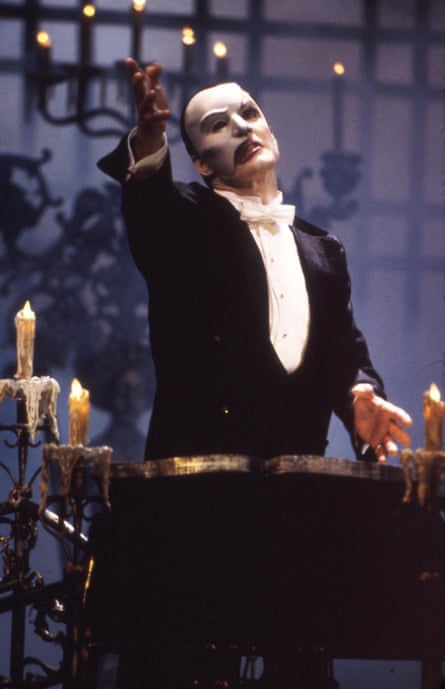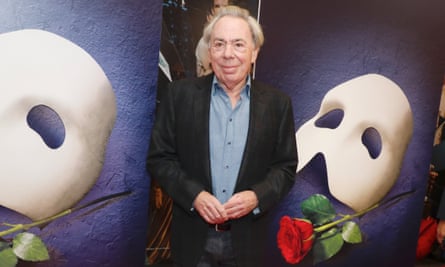He is used to having the worst seat in the house. Playing trumpet in the orchestra pit, Lowell Hershey has heard by Broadway audiences for decades but seldom gets to see the show himself. When The Phantom of the Opera opened in 1988, however, the Fomo became too much.
“I had never seen the show – I can’t even see the stage,” he says. “So about six months into the show I bought a ticket, hired a sub and and I sat the audience to watch because I was curious to see what the heck was such a big deal about this.”
As of last Saturday, by Hershey’s count, Phantom had run for 13,973 performances, and he had played trumpet in 10,059 of them. When the production closes on Sunday after 35 years, an all-time Broadway record, he will be in his usual spot at the Majestic Theatre for its swansong.
Phantom superfans are sure to be scrambling for tickets for a last chance to hear songs such as Masquerade, Angel of Music, All I Ask of You and The Music of the Night. Based on the 1910 French novel Le Fantôme de l’Opéra by Gaston Leroux, the story revolves around a mysterious and disfigured phantom who haunts the Paris Opera House and falls in love with the young soprano, Christine Daaé.
The musical by Andrew Lloyd Webber has been seen by more than 140 million people worldwide and grossed more than $6bn in revenue. The British actor Michael Crawford was the original phantom in both the West End and Broadway productions (Gerard Butler played the part in a 2004 film adaption).
But the show has also left critics cold. Some regard it as a gaudy spectacle, the vanguard of a “British invasion” of New York theatre that put style over substance, commercial smarts over high art. In the prosecutor’s case against “the blockbuster musical” and all that implies, it may well be Exhibit A.
Don’t tell that to Hershey, who took up the trumpet when he was nine and has played in many Broadway shows including Nicholas Nickleby, Big River, Rockabye Hamlet, Fiddler on the Roof, A Little Night Music and Follies. When the job on Phantom came up, he instantly warmed to its lush, romantic score.
“I thought the music sounded good,” the 75-year-old says by phone from New York. “The parts that we play were beautifully orchestrated. If you don’t understand the instrument, it’s possible to sit and write down a trumpet part that is impossible to play, even though it might be within the range of what a trumpeter is capable of playing.
“The orchestrator that did Phantom clearly understood all the instruments. There aren’t too many orchestrators that know how to write for harp but he did, so the harp part is just beautiful and not incredibly difficult. He made it playable. My first reaction was: oh, this is going to be pleasant!”
Phantom’s instant success on Broadway did not entirely take Hershey by surprise because it had already been playing to packed audiences in London. “When it was announced that it was going to be opening in New York, there was no doubt in anybody’s mind that this was going to be a pretty big hit, that regardless of what the reviews in New York said, it was going to run for maybe a couple of years at least. There wasn’t anybody that would have thought that it could go 35 years. There has never been anything like that.”
After three and a half decades, Hershey must know every line off by heart? “Certainly there’s nothing that surprises me except when somebody delivers the wrong line or something goes wrong. Every once in a while there is a little snafu and that wakes me out of my reverie.”
At one show, he recalls, the celebrated chandelier drop at the end of the first act could not take place for safety reasons because an absent-minded stagehand had accidentally left some sheet music on it. “I remember walking by the stage door on the way out and hearing a voice inside saying: ‘Tell me again how the music ended up on the chandelier.’”
Phantom runs in the family. His daughter performed in the roadshow version of the musical for two years. So the end of Phantom’s run – widely seen as an aftershock of the coronavirus pandemic that reduced tourism – will inevitably be a moment of reflection, although he has no intention of retiring.
“It’s sad. There’s no doubt about it because I’ve had this family that I hang out with. Musicians are always at the theatre well before the show starts. Some people may come in only 10 minutes before, but it’s not the kind of job where you can just walk in, walk to your desk and do your work.

“You have be there and then be ready to play at a particular time. So we hang out there and we shoot the shit: you’re talking to people and these people have become family. Even some of the subs who aren’t members of the orchestra full time have been subbing at the show for more than 30 years. I’ll miss the hang.”
When the final curtain comes down on Sunday, there will be plenty of time to reflect on how and why Phantom became the longest-running show in Broadway history (the crown now passes to Chicago, which started in 1996) and won seven Tony awards and seven Drama Desk awards. Hershey has a couple of thoughts.
One is its producer: Cameron Mackintosh, whose shows Les Misérables and Cats also enjoyed epic longevity. “This guy changed how Broadway shows are marketed to people. I can’t understand why Cats ran for so long being the kind of show that it was: there wasn’t that much there. He is basically a genius of marketing.”
The other key was the director: Hal Prince. Hershey comments: “He probably pushed Andrew Lloyd Webber in ways to direct in terms of character development and this, that and the other thing that made it what it is. He was amazing.”
Hershey suggests that Broadway had been dying in the 1970s and that the “British invasion” helped turn it into a popular tourist destination. This version of events has led to much ambivalence about Lloyd Webber’s legacy. Five years ago a headline in the New Yorker magazine asked: “Did Andrew Lloyd Webber ruin the musical or rescue it?”
Hershey is adamant: “It always pisses off reviewers when they’re going to review a show and they realise that, whatever they write, it’s not going to matter because we had a $26m advance sale when we opened. At the time, 1988, it was a pretty big advance and so they could have written the worst possible reviews and it wouldn’t have made a difference to whether people came or not. That’s nettlesome for them.”
Some reviewers were indeed sceptical. Frank Rich, theatre critic of the New York Times, found the lyrics to be full of “numbing, interchangeable pseudo-Hammersteinisms” and the score “so generic that most of the songs could be reordered and redistributed among the characters (indeed, among other Lloyd Webber musicals) without altering the show’s story or meaning”.
He wrote: “Mr Lloyd Webber’s esthetic has never been more baldly stated than in this show, which favors the decorative trappings of art over the troublesome substance of culture and finds more eroticism in rococo opulence and conspicuous consumption than in love or sex.”
A generation later, Phantom arguably remains a glossy monument to 1980s kitsch, a bejewelled music box that springs open to reveal its own hollowness. It has earned a place in the new Museum of Broadway, which includes a chandelier installation made up of more than 13,000 glistening crystals, each representing a Broadway performance of the show.
Ben West, the museum’s resident historian and timeline walls curator, says: “This is not a well-written musical. If one is to do an objective analysis of The Phantom of the Opera this is not a great show but there is a difference between the show, which is the underlying work, and the production of said material which you see on stage.
“The production is extraordinary. It is Harold Prince at the top of his game. It is an extraordinary feat of showmanship and stagecraft on his part and the other members of the physical creative team. His staging uses every inch of the stage and it is constantly interesting and has an extraordinary tension in it that makes up for a tension that is lacking in the show itself.”

West, a musical theatre artist and author of the upcoming book The American Musical, continues: “It is just an extraordinary staging of a very underdone work and I do think the staging is largely what people are responding to: a very artful spectacle. I see the deep flaws and inadequacies in the material and yet Harold Prince’s production of the show is quite extraordinary.
“I feel that the success in no small measure is due to his work. Certainly there’s the Andrew Lloyd Webber name recognition factor and the ear-worm melodies with their endless repetition which certainly enhance the memorability of a particular piece. In terms of looking at it as a musical theatre work in the grand scheme, for me it really is a Harold Prince triumph first and foremost.”
Phantom spawned a less successful sequel, Love Never Dies, and it seems fair to assume that Phantom will never die either. It marches on in London until at least March, shows its masked face all over the world and will probably make a dramatic and lucrative Broadway comeback some day.
John Flynn, author of Phantoms of the Opera: The Face Behind the Mask, has seen the show 13 times on three continents. He says: “There’s an underlying base there that has to do with every man or woman who’s ever been considered an underdog. The phantom himself is disfigured but he’s no different from anybody else.
“There are a lot of men out there that women don’t want to go out with on a date because they may not look like the traditional leading man, if you will. Everyone like that is the phantom. They just want to be loved.”
Speaking from West Palm Beach, Florida, Flynn, 68, adds: “The Really Useful Group put a lot of money into making the show look brilliant and I’m actually a little sad that it’s ending its record-breaking run on Broadway, because I would have thought it would have continued to run for years. But it will come back in a few years and there’ll be a brand new take on it and I’m looking forward to that.”

